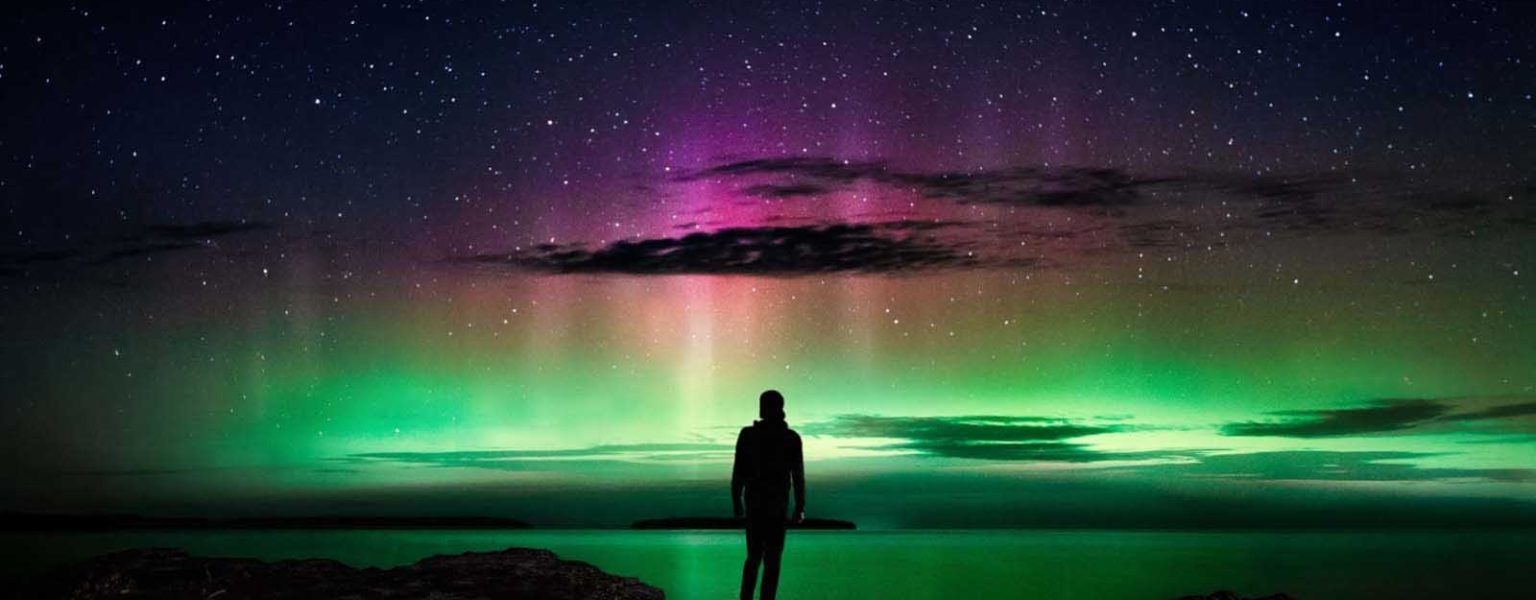If you are searching for places to see the northern lights, look no further. These destinations offer some of the best views of this natural phenomenon.
Where To See Northern Lights Canada
The Magic of the Aurora Borealis in Canada
Canada is blessed with a northern location and vast, dark skies that is located within the Aurora Oval in the world’s northern hemisphere making it the premier place to see the Northern Lights. We will unravel the magic of the Canadian aurora borealis and delve into the profound connection Indigenous Peoples have with this awe-inspiring phenomenon.
Understanding the Aurora Borealis
The science behind the Northern Lights is fascinating, but its cultural significance is equally compelling. Indigenous Peoples in Canada view the Aurora Borealis as a spiritual and ancestral connection, with various communities believing that the lights represent a never-ending energy and a link to their ancestors. This deep connection to the Northern Lights adds an extra layer of wonder to an already captivating experience.
The Perfect Time for Northern Lights Viewing
While you may think summer would be an ideal time for aurora hunting, the midnight sun in some of Canada’s northernmost regions actually drowns out the Northern Lights, making them barely visible, if at all in the summer. So, for the best chance of witnessing this natural wonder, plan your trip during the darker winter months.
The Auroral Oval
In these regions, charged particles emitted from the sun (solar wind) interact with the Earth’s magnetic field and collide with gases in the Earth’s atmosphere, causing the spectacular light displays for which the auroras are known.
Its visibility can be affected by solar activity, weather conditions, and light pollution. If you want to see northern lights, it’s recommended to be as far north as possible within the auroral oval, in a location with a clear dark night sky, and to monitor auroral activity.
When solar wind and Earth’s magnetic field interact during prime Aurora months, it causes a disturbance in the magnetosphere, leading to the Northern Lights. This interaction creates a reaction that makes the magnetic field lines stretch, twist, and release energy, resulting in the beautiful colors and shapes of the auroras. So, for the best odds of catching this incredible light show, plan your trip during the prime months for Aurora viewing.
Optimal Hours and Moon Phases
A full moon can make the Aurora look washed out to the naked eye. But photographers will be able to capture the lights even without seeing the northern lights vividly.
The best moon to see northern lights in is a new moon or crescent moon. The darker the skies the better chance of seeing the northern lights with your eyes.
Top Canadian Destinations for Northern Lights Chasing
We are going to cover the most popular aurora experiences in Canada such as The Yukon, Northwest Territories, Nunavut, Northern Manitoba, Northern Quebec, Northern Alberta, Saskatchewan, Ontario, and Newfoundland and Labrador.
November to March is considered the prime time to see northern lights in Canada due to increased solar activity during these months.
Churchill, Manitoba
We travel with Churchill Wild who has three lodges on the Hudson Bay. Being far away from the light pollution in the city, these lodges are one of the best places to see the northern lights in the world. You really can rely on catching a glimpse. Churchill is so reliable that you may spot the lights anytime, even in summer.
You don’t need to go to a remote lodge though, Churchill is a small town with plenty of opportunities to see the northern lights. It’s more affordable to stay in Churchill where you can choose from cozy hotels or traditional lodge that will take you out on a a Tundra Buggy Explorer trip.
Best time to go: November through March Nights visible: Up to 300 nights per year
Whitehorse, Yukon
While Whitehorse is easily accessible, why not make your way to our favorite city in the Yukon, Dawson City? This is more of a village than a city. The town sits on the Yukon River under a hill called the Midnight Dome where visitors watch the midnight sun during the summer months, but in the winter, it’s an excellent spot to see northern lights dazzle above the town.
What Else Is there to do in the Yukon in Winter
After all that activity, you can relax and unwind by soaking in the outdoor pools at the Takhini Hot Springs. It’s a fantastic way to spend your time as you anticipate the incredible light show that awaits you.
Don’t forget to explore the charming Main Street and other attractions during your stay in this enchanting Yukon destination.
For a truly immersive Northern Lights experience, consider staying at the Northern Lights Resort & Spa, which offers chalets with large glass windows for unobstructed Aurora views. Additionally, one-night Northern Lights tours are available in Whitehorse, a location with mesmerizing city lights, for those short on time.
The best time to go: November through the end of April Nights visible: Up to 240 nights per year
Yellowknife, Northwest Territories
The best time to visit Yellowknife for Aurora hunting is between November and April. During your stay, you can choose from various hotels and activity centers focused on the Northern Lights experience.
What to do in Yellowknife
If you’re a fan of flying, you’re in for a treat. The package includes a float plane trip that will give you a bird’s eye view of the breathtaking landscapes. And if you’re an animal lover, you’ll love the tour of the bison sanctuary. It’s a unique opportunity to see these majestic creatures in their natural habitat.
The best time to go: December to April Nights visible: Up to 240 nights per year
The Canadian Rockies – Jasper National Park
Jasper is a designated Dark Sky Preserve thanks to its clear skies and low light pollution. It is an ideal location for witnessing the Northern Lights up to 300 nights a year. The best time to visit Jasper to see the northern lights is between September and May when the northern skies are dark for hours. However, you can spot lights year-round if the conditions are right.
Apart from chasing the Northern Lights, Jasper National Park offers a range of exciting activities, such as hiking, cross-country skiing, mountain biking, and wildlife spotting. Don’t miss the annual Dark Sky Festival in October, which celebrates the park’s pristine night skies and offers a fantastic opportunity to catch the Aurora Borealis. It is one of the best places in the world to see the northern lights thanks to its clear skies. Check out: 14 Best Hikes in Jasper National Park – Alberta Canada
The best time to go: September to May Nights visible: Up to 300 nights per year
The park’s high elevation and clear, dark skies create the perfect conditions for spotting the Aurora. Some of the best places to try your luck in Banff include Lake Minnewanka, Castle Mountain, and Peyto Lake. Just remember, patience is key when it comes to Aurora hunting! The Best Things to Do in Banff, Canada
Newfoundland and Labrador
Things to do in Newfoundland and Labrador
Next on your list should be the Cape Spear Lighthouse National Historic Site which dates back to the 19th century. As the most easterly point in North America, it offers breathtaking views of the Atlantic Ocean.
A visit to Gros Morne National Park is a must. With its diverse landscape of mountains, forests, and coastal lowlands, it offers plenty of hiking trails where you can immerse yourself in the beauty of nature.
Finally, round off your visit with a trip to L’Anse aux Meadows National Historic Site. This archaeological site is the only known Viking settlement in North America.
The best time to go: September and October, and March and April Nights visible: Up to 60 nights per year
Kuujjuaq, Quebec
If you really want to witness the Aurora Borealis, Kuujjuaq, Quebec is the place. Its northern location and proximity to the Aurora Oval provide incredible opportunities for witnessing the Northern Lights, especially between October and March.
What is there to do in Kuujjuaq Quebec?
During your stay, you can also participate in activities such as trout fishing and spotting local wildlife like caribou and Musk Ox.
The best time to go: October and March Nights visible: Up to 240 nights per year
Preparing for the Cold of Northern Canada
In addition to clothing, we suggest packing ski goggles, hand warmers and foot warmers, balaclava, insulated boots, and a warm hat. See our tips 5 Winter Layering Tips to Dress for Extreme Cold Weather
Checking Aurora Forecasts
To see how your chances of seeing the Northern Lights are, check the Aurora forecast or the Kp index. The higher the Kp index, the higher the geomagnetic activity, and the better your chances of seeing the Northern Lights.
You can check the forecast on sites like NOAA Space Weather or Aurora Notify, which provide estimated Kp levels for the next few days. We use the Aurora Forecast
Photographing the Northern Lights
Photographing the Northern Lights can be challenging. To capture stunning images of the Aurora Borealis, you’ll need a camera with manual settings, a fast wide-angle or ultra-wide-angle lens, and a tripod to keep your camera steady during long exposures. However, Deb caught some great images of the Northern Lights with her iPhone 15 ProMax.
Experiment with capturing the Northern Lights by:
Using slow shutter speeds of 10-15 seconds and night mode Keep your ISO as low as you can to eliminate noise. Use manual focus and focus to infinity on your lens. Consider using an external trigger to control your camera remotely or using the 2-second timer on your camera. Keeping in mind composition rules like including a foreground element or a north-facing composition to get the lights in the sky Not being afraid to experiment and have fun with your shots
By following these tips, you’ll be sure to capture the best Northern Lights images, showcasing the magical beauty of the Northern Lights images to cherish for a lifetime.
Is a Northern Lights Tour Worth It?
Popular Northern Lights tour packages cater to different preferences and budgets, with prices starting at around $2,900 and going up to over $7,000 depending on the hotel class, region, time of year, and length of stay for northern lights viewing.
Some reputable companies offering Northern Lights tours in Canada include Churchill Wild (Polar Bear Tours and Northern Lights Combine, TourRadar, Canada by Design, Adventures.com, Northern Tales, and Intrepid Travel.
These tour packages often include:
Round-trip airport, hotel, and tour ground transportation Multiple nights of Aurora hunting tours Free hot beverages and snacks during the tours The option to get Aurora group participation pictures
By choosing a guided tour package, you can enjoy a memorable and well-organized Northern Lights experience that caters to your specific interests and needs.
About the Northern Lights
What month is best to see the northern lights in Canada?
The best time to see the Northern Lights in Canada is from November to March when the nights are long and dark with clear skies. This allows for a higher probability of viewing the show due to the darkness which makes the lights appear brighter. You can see them as early as September and as late as April.
Where in Canada are there Northern Lights?
Churchill is the best place to see Northern Lights in Canada. Yellowknife, in Canada’s Northwest Territories, is also the best place to witness the Northern Lights display in Canada. Located south of the Arctic Circle and under the Aurora Oval is is one of the closest cities in Canada to the North Pole,
Can you see the northern lights in Calgary Canada?
You can see the northern lights in Calgary, depending on the intensity of geomagnetic storms (G3 or stronger). Just make sure to get away from the city lights to avoid light pollution.
What time will the northern lights be visible in Alberta?
The Northern Lights are best seen in Edmonton from 10 p.m. to 2 a.m., with peak viewing around midnight. Don’t forget to look north after dark!
What are some top Canadian destinations for Northern Lights?
Churchill, Manitoba; Whitehorse, Yukon; Yellowknife, Northwest Territories; Jasper, Alberta; Newfoundland and Labrador; and Kuujjuaq, Quebec.
So, whether you’re a seasoned Aurora chaser or a first-time adventurer, embark on this incredible journey to unlock the spectacular beauty of the Northern Lights in Canada. The sky is waiting to captivate and inspire you.
Plan More of Your Winter Trips to Canada
Read Next: 38 Best Things to Do in Belfast, Northern Ireland


